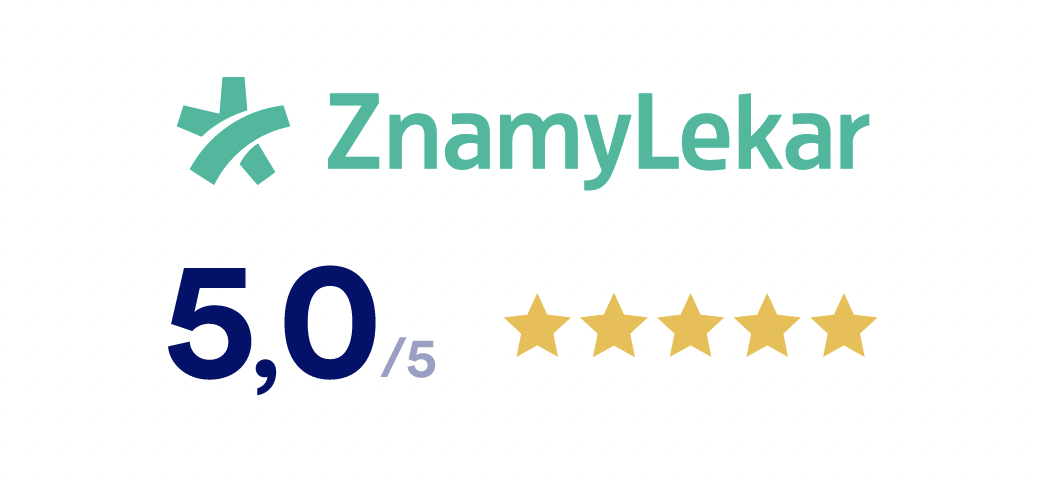CATARACT - COMMON QUESTIONS
How is a cataract formed?
Cataract is a disease of the lens, which is most often caused by aging (senile cataract). Most of the operated cataracts comprise of this very type. The cataract can be caused by permanent intake of some medicine (mostly corticosteroids) or due to some other general disease or eye disease. Another cause of the cataract may be for example preceding eye injury, severe eye inflammation, tumour in the eye, metabolic or systemic disease.
How is a cataract detected?
You can notice some of the following signs depending on the type and intensity of the cataract:
- blurry vision, defocused vision (mostly when observing objects in the distance)
- colours are not as intense as with the other eye, they refract and have different intensity and hue
- looking with one eye, the objects appear to be doubled to tripled
The diagnosis of the cataract can be verified by the complete eye examination only.
What should I bring along for the preoperative examination?
You should have your insurance card, list of medicine you take and alternatively the recommendation (notice) of your practitioner.
What is the procedure of the preoperative examination?
After the registration at the front desk our nurse will measure your intraocular pressure and makes some measurements with autorefractometer. Afterwards you pass the interview with surgeon, tests for distance and near vision and anterior segment examination. After that drops for dilation of the pupil will be placed in your eyes and within 30-40 minutes follows a second part of the examination. Your surgeon then informs you about further steps and suggests the most suitable intraocular lenses for your eyes.
Will I see in all vision ranges without my glasses after the surgery?
The sight is usually sharp in one vision range only after the cataract surgery. It is advisable to keep glasses for distance vision for the patient who wears them all his life. The patient, who wore reading glasses, will still need them for sharp vision for reading distance.
Vision for all the distances depends on the type of intraocular lens. The Eye Centre Prague offers quality lenses allowing vision at all distances without further need of glasses. It depends on the preliminary examination, whether a patient may be implanted the lens for all distances.
What is the procedure of the cataract surgery?
The human cataract clouded lens is replaced with the intraocular lens during the surgery. There stays just the capsular bag in the eye, which the artificial intraocular lens is implanted in. The entire process is carried out under local anaesthesia (eye drops)
How long does the surgery take?
The surgery itself takes about 15 minutes. Together with the total preoperative preparation the patient spends 2-3 hours at the clinic.
May I choose the type of the intraocular lens myself?
The human cataract clouded lens is replaced with the clear artificial one during the surgery. These lenses are produced in various versions. The basic type of the intraocular lens is fully covered by health insurance. The premium and above-standard lenses are available for additional cost. These lenses are optimized for better vision in the dark and protection of the retina because of the yellow filter covering them. More information on the features and additional charges can be found here.
What is an accommodation lens?
The accommodation lens allows good distance vision, intermediate vision (computer) and near vision – bigger letters. For reading small letter (e.g. manuals for use) the patient needs low dioptre reading glasses. The advantage of the accommodation lens is its lack of some undesirable optical phenomena unlike multifocal lens. Therefore this type of lens is more preferable for e.g. professional drivers.
Is the implantation of the above-standard lenses suitable for me?
Whether you are the right person for premium intraocular lenses will be considered by the surgeon after the preliminary examination. Generally, the suitable patient is the one who wears reading and distance vision glasses as well. The premium lens implantation is not appropriate in the presence of some other eye disease. The lens may not perform its proper function in this case and the patient may not be satisfied then. Thus all the patients need to undergo thorough examination, so that we can be sure the premium or above-standard lens will function in the patient’s eye properly.
When and where do I go for the check-up after the surgery?
The postoperative examination is recommended within 3 days after the surgery at our Eye Centre or at you eye specialist. It depends on the agreement with your eye specialist and what you prefer.
When can I get my glasses prescribed after the surgery?
You will get the reading/distance glasses prescribed at the Eye Centre or at you eye doctor’s approximately one month after the surgery, when the vision is stable and the dioptres do no longer change.

Diskuze k článku
Máte-li k článku nějaký dotaz nebo komentář, podělte se s námi. Budeme rádi za všechny vaše podněty. Příspěvek vytvoříte stisknutím tlačítka “Vložit příspěvek”.
Vložit příspěvekBuďte první, kdo komentuje tento článek.









